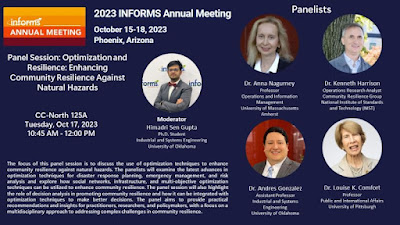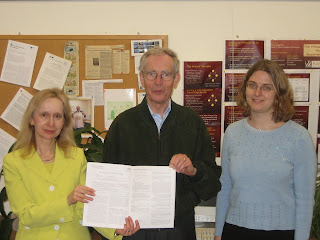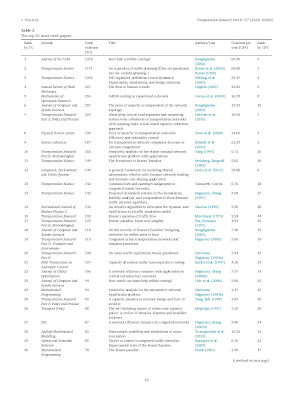It is truly extraordinary that this year's INFORMS Annual Meeting attracted over 6,000 delegates to Phoenix. The conference took place October 15-28, 2023 and convened operations researchers and analytics professionals from academia, practice and government. All continents except for Antarctica were represented and the INFORMS President Laura Albert remarked that, next year, perhaps even someone from that continent will join us.
To me, INFORMS is about the people/members, and I especially delighted in seeing several of my former PhD students, who are now thriving as professors at various universities (Dmytro Matsypura at the University of Sydney in Australia, Deniz Besik at the University of Richmond, Shivani Shukla at the University of San Francisco and Sara Saberi at WPI) and having one of my PhD students (Dana Hassani) present at his first such conference the paper that we co-authored with Kyiv School of Economics (KSE) colleagues in Ukraine. It was published in the Journal of Global Optimization as the lead article in an issue and was on display at the Springer booth in the Exhibit Hall. We got to keep the stunning Journal of Global Optimization issue. It was also very special to see both my Labor and Supply Chain Networks book, published in 2023, and the Dynamics of Disasters book that I co-edited with Ilias S. Kotsireas, Panos M. Pardalos and Arsenios Tsokas on display at the Springer booth. Lovely to chat with Pardalos, his wife and son in Phoenix!
Seeing colleagues for the first time in person was also extra special since, in the pandemic, new connections were made virtually but only recently have the travel and the face to face exchanges become possible (and are so very welcome). The technical sessions and plenary and keynote talks were excellent and not all could be attended because quite a few took place "in parallel."
I thoroughly enjoyed various board meetings, including that of the INFORMS Magazine Editorial Advisory Board with Kara Tucker and committee members at 8AM on Sunday morning, as well as the Editorial Board meeting of the International Transactions in Operational Research (ITOR), led by its Editor, Celso C. Ribeiro. The Editorial Board meeting of the Journal of Global Optimization, whose Editor is Sergiy Butenko, was also very enjoyable and the food was excellent - thank you, Springer, the publisher!
It was an honor to present an invited paper and also to speak on two panels: one on optimization and community resilience and the other one - Meet the ITOR Editors! Thanks to Professor Nazanin Tajik of Mississippi State University for inviting me to speak in her session. I was so honored to even receive a gift and special note from her in appreciation. My presentation on defense critical supply chains and risk management can be viewed here. Our other presentations are posted also on the Supernetworks Center site. The resilience panel did not have panelists' slides but it was so good that it went way over and I missed the WORMS (Women in Operations Research and the Management Sciences) lunch! Thanks to Himadri Sen Gupta of the University of Oklahoma for organizing this panel and to his PhD advisor - Andres Gonzalez!
The business meetings were very well-attended and I especially enjoyed the Transportation Science & Logistics Society business meeting at which Hani S. Mahmassani received the Robert Herman Lifetime Achievement Award in Transportation Science.
The INFORMS Fellows luncheon at which the newly inducted Fellows were recognized was deeply engaging and pleasant. It was an honor to share a table with Roman Slowinski, who traveled with his wife from Poznan, Poland, and well as other colleagues, including Ben Lev and Candi Yano!
It was delightful to meet new colleagues and to reconnect with many others. I wish that I could list everyone that made this conference so memorable for me - you remain in my pleasant memories - thank you.
Congratulations to all who received awards! Extra proud that our UMass Amherst INFORMS Student Chapter was recognized with the INFORMS Magna Cum Laude Award.
Below is a collage constructed as a remembrance of some of the highlights. Many thanks to the organizers and to all those who took part.






-reduced.jpg)





















